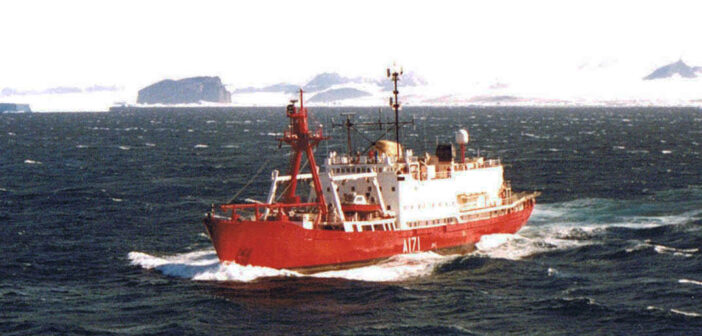As the world looks for lessons from Russia’s war on Ukraine, it’s worth recalling the hard-learned of the Falkland Islands War four decades ago.
Many recall Britain’s extraordinary campaign to retake the Falklands from Argentine occupation, sailing its fleet some 8,000 miles to liberate islands just 500 miles from Argentina.
Lost in the triumphs, firsts and acts of bravery, however, were the short-sighted decisions and ignored warnings that led to an invasion that precipitated a war that cost 1,000 lives, wounded twice as many, and destroyed 16 ships and 130 aircraft.
The war, like so many others, was triggered by an Argentine miscalculation shaped by the British government’s own actions.
In June 1981, British Prime Minister Margaret Thatcher’s defense review specified deep cuts to the country’s armed forces, particularly the Royal Navy. The first of its three new Invincible-class aircraft carriers was to be sold to Australia, warships decommissioned or mothballed, and the ice patrol ship HMS Endurance that supported the British Antarctic Survey and served as the guard ship for the Falkland and South Georgia islands was to be retired without replacement.
Affectionately known as “The Red Plum” for its paint job and reputation as a choice assignment, the ship was a tangible manifestation of Britain’s interest in the region. To save 3 million pounds a year, she was scheduled to be decommissioned on April 15, 1982.
That move, however, combined with other signals from the new government, suggested to Argentina that the British government was no longer committed to the Falkland Islands and their defense. Seeing Britain mired in recession and continuing its long decline, the Galtieri junta began planning to retake them by force once Endurance was gone, reasoning London had neither the will and would — given coming defense cuts — be unable to respond.
Ironically, it was on Endurance’s final visits to Argentina and Chile in late 1981 and early 1982 enroute home to Chatham that the ship’s commander, Capt. Nick Barker, was told by Argentine and Chilean officers that Argentina would soon attack the Falklands.
Barker reported this vital intelligence to London where his warnings were dismissed as merely part of the campaign to keep Endurance in service.
There was nothing formidable about Endurance. Built in Germany in 1956 as a cargo ship, she was acquired by the Royal Navy in 1967 and equipped with two tiny Wasp helicopters, two 20mm Oerlikon cannons, some AS12 missiles and 22 Royal Marines in additional a crew of 110.
But its presence was a tangible manifestation of Britain’s commitment to the entire region. It didn’t matter whether the ship was a small converted cargo ship or a destroyer, rather that London cared enough to have something south of the equator.
Its departure, then, was a signal that cleared the way a bloody and expensive war.
Had Endurance remained on station and Britain — heeding Barker’s warnings — rapidly increased its presence on the islands, war would have been averted. During these war, she played a key role, including in the recapture of South Georgia Island on April 26, 1982.
As the United States seek to avert war with China, it’s vital to remember the lessons from the Falklands. The importance of moving fast to maintain advantage, an extraordinary military culture of agility and improvisation on the fly, long-range logistics, and a clear rules of engagement that allow maximum operational flexibility.
But perhaps the most important is deterrence and preventing sending Beijing the wrong signals that could lead to miscalculation that results in conflict.
Indeed, it’s worth remembering the parallels between Britain’s operation to retake the Falklands and what the United States would have to do to retake Taiwan in the event of Chinese invasion. That parallel is why Beijing spends so much time studying the Falklands campaign.
The lessons from the Falklands are especially critical as Congress deliberates the Biden administration’s $773 billion defense budget request that seeks to retire manpower, presence and engagement capabilities as well as increasingly costly aging systems, for newer capability better suited to high-intensity warfighting.
Although the request is the highest ever for defense spending, it’s still not enough to grow the force and improve its capabilities. As such, it prioritizes high-intensity capabilities over capacity and presence, in the process accepting near-to-mid-term risk until future capabilities are fielded.
For two decades, I have been among those who have argued it’s time for smarter tradeoffs.
The trouble is, these tradeoffs should have been made a decade or more ago. Doing them now, with war raging in Europe and China bent on taking Taiwan is simply too risky.
It would be far wiser at this point for the United States to retain what capability it has while accelerating what’s needed, only then retiring what’s not.
And it’s a deeply flawed assumption that the only capability needed are high-intensity ones, a goal driven less by strategy than spending targets.
If you think you face a high-intensity fight with your leading potential adversary, and you have a fixed budget, these tradeoffs are understandable.
But that risks the erosion of presence that’s equally critical to underscore US interest in the region. That’s the lesson on Endurance. America must step up its warfighting game, but not at the expense of presence.
The disconnects are most glaring with the Navy’s budget request.
Service leaders — who long argued they need more ships and missile tubes — now say aging cruisers are too expensive to operate, Freedom-class Littoral Combat ships too limited in capability, and amphibious and surface forces need new ships.
So 24 ships will be retired this year alone ensuring a 280-ship Navy by 2027, Beijing’s deadline for uniting with Taiwan, by force, if necessary.
Any sailor or mountain climber will tell you that you can’t release one handhold until you have another one.
Rather than retain serviceable if costly capability until replacements arrive, the administration it committed to freeing resources for new systems. But this plan only makes sense if the Navy delivers these ships in the next two to five years, rather than the coming decade or two. The Navy picked an off-the-shelf-design to ensure much-needed anti submarine capabilities are quickly fielded, but continual design changes will delay Constellation’s introduction that remains a decade away.
Again, this is the wrong signal at the wrong time.
That’s a far cheaper option than fighting a war because of mixed signals that prompt an adversary to miscalculate, as did the Argentines over the Falklands.
Buenos Aires simply didn’t expect Britain to fight over the Falklands. Margaret Thatcher did so, in the process reinvigorating her flagging popularity and sending a powerful deterrent signal to Moscow at a perilous Cold War period.
Like the Argentine junta did Britain, China sees America in inexorable decline and unlikely to fight over Taiwan.
What all dictatorships have in common is their tendency to miscalculate. It doesn’t matter whether the despot’s name is Hitler, Galtieri, Putin or Xi. It’s imperative that every signal from Washington and its allies send — in words and deeds — makes it harder for them to miscalculate.




